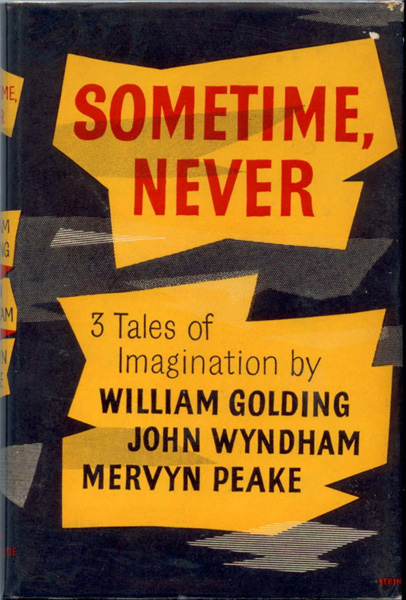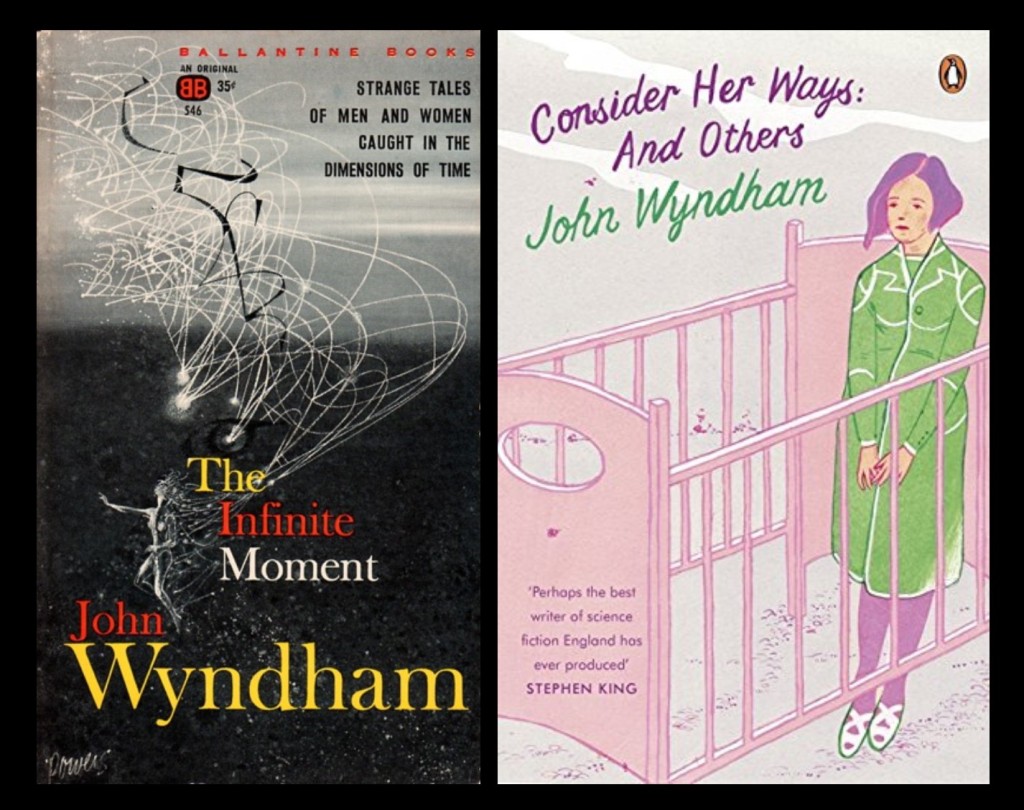
“Consider Her Ways” was first published in the original anthology, Sometime, Never. It is story #22 of 22 for The Best SF Stories of 1956 group read. Unfortunately, I can’t link to a copy of the story to read online, but you might already own one of the many anthologies where it’s been reprinted. I read “Consider Her Ways” in A Science Fiction Argosy edited by Damon Knight. But I also own it in The Science Fiction Century edited by David G. Hartwell. The story was also included in two of Wyndham’s collections:

I strongly urge you to read the story before reading what I have to say. It’s an exceptional yarn, a classic, and I don’t want to spoil your reading fun. “Consider Her Ways” begins with a woman waking up in a hospital and having no memory of who she is or how she got there. That mystery continues for many pages, and I never guessed the cause.
Let me say, “Consider Her Ways” is a feminist utopian tale that most will consider a dystopia. But what defines a better society? If you’ve read and enjoyed Herland by Charlotte Perkins Gilman, you might want to read “Consider Her Ways.”
“Consider Her Ways” is a very old-fashioned science fiction, reminding me of Looking Backward by Edward Bellamy, When the Sleeper Wakes by H. G. Wells, Brave New World by Aldous Huxley, and Beyond This Horizon by Robert A. Heinlein. John Wyndham uses his story to speculate about a future society while commenting on our present society. Referring to these books should give you enough of a clue to the plot of “Consider Her Ways.”
Especially in the 19th century, and to a degree in the 20th century, writers who wanted to write about traveling to the future but without resorting to a time machine, had their present-day characters going into a deep sleep and waking up in the future. John Wyndam invents a drug, chuinjuntin, from South American jungles, which causes a young 20th century woman to project her soul into the body of a woman in the future. Wyndam, solved the problem of return travel by using the same drug again. Mostly sleepers into the future are stuck there unless the story is only a dream. Heinlein had Dan Davis travel to the future via cold sleep in The Door into Summer, but then used a time machine to get him back to 1970.
I won’t go into the society Wyndham creates, other than to say its without men. Jane Waterleigh, our time traveler, does not like the feminist utopia she’s visited and tries to prevent it when she returns to her own time. I’ll call this future, the pink future, since its decor is often painted pink. The pink future Wyndham imagines for women is obviously horrifying from our perspective, but Laura and the other women of the future were completely satisfied with it, even proud of their society. I wasn’t sure I wanted Jane to destroy it. I think each reader will have a different take on Wyndham’s imagined future. Utopia is so hard to define. I don’t think a perfect utopia is possible, but the pink future in “Consider Her Ways” has no violence, lack, ugliness, or apparent unhappiness. However, it has an ant-like social structure. Jane finds herself in a huge body of a woman, a class called mothers. They produced broods of babies, four at a time, and are treated very well.
Wyndham’s missed one point. Jane claims the pink future has no love and romance, and thus a depressing dystopia. What about lesbian love, romance, and sex? Wyndham assumes without men; women wouldn’t have romantic relationships. Even in 1956, that should have been obviously wrong.
We all read stories differently, using fictional clues to customize our versions of the story, based on different assumptions, reactions, wants, and conclusions. Here’s what my friend Mike wrote to me about “Consider Her Ways.”
Ever since I first read The Day of the Triffids back in the sixties, I've been taken with John Wyndham's work. His beautiful prose describes deeply unsettling situations and events.
In "Consider Her Ways," a woman "...who had no idea who I was, or where I was..." is confronted with this vision: "In front of me stood an outrageous travesty, an elephantine female form, looking more huge for its pink swathings."
Only Wyndham could conjure up this disturbing description:
"And this delicate face, this little Fragonard, was set upon that monstrous body: no less outrageously might a blossom of freesia sprout from a turnip."
What transpires is an elaborate hallucination or the future (or one of a number of alternate futures). Jane is confronted with a civilization devoid of men. Her long conversation with the historian Laura could be considered an info dump, but is fascinating and adds considerable depth and nuance to the story. Even after more than sixty-five years it resonates with the reader.
Wyndham never allows us to feel comfortable. Are we dealing with a woman's bad drug trip? Have we had a glimpse of the future? And what do we think about that future? We're left with a jumble of emotions all wrapped up inside of Wyndham's masterful writing.
Mike is open-minded, leaving several possibilities available. I took a different reading route. I accepted Jane’s tale as an actual time travel story. Mike left open the possibility it was all a hallucination, and Jane murdered innocent Dr. Perrigan in an insane delusional state. But Wyndham makes it more complicated. In the end, Dr. Hellyer, Jane’s colleague who gave her the psychoactive drug to test, and Jane’s lawyer, discuss getting Jane off from the murder charge based on insanity. But they wonder if her story is true. Then the lawyer points out that Dr. Perrigan had a son who was also a Ph.D. researcher in the same area as his father. What if Jane’s story is true, but she killed the wrong person?
The story could be a hallucination. The time travel story could be true, but it can take two forms. One, Jane changes, the future, but two, she doesn’t. All the possibilities make “Consider Her Ways” a compelling story. It allows Wyndham to play with several time travel tropes in one tale. Such bendiness makes for great writing.
James Wallace Harris, 1/16/23
Mr. Harris:
Did you know that this story was made into an “Alfred Hitchcock Hour” television episode back in 1964? It was quite good. The MeTV channel shows Hitchcock episodes overnight, and it appears every now and then. If you’re not a night owl like me, watch the listings, and then set whatever recording device you may have.
LikeLike
I’ll track it down. Thanks.
LikeLike